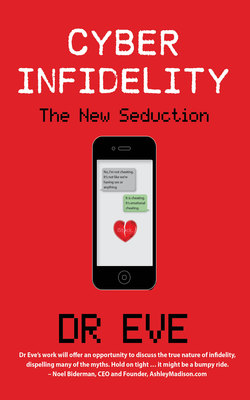Читать книгу Cyber Infidelity - Dr Eve - Страница 11
На сайте Литреса книга снята с продажи.
Length of real-life relationship
ОглавлениеLength of marriage plays a significant role in your relationship satisfaction and dissatisfaction. The longer your marriage, the more likely that you will be vulnerable to CI. Makes sense, right? You lose attraction; familiarity makes the marriage feel like living with a family member rather than with a lover; sexual activity drops in frequency; and intimate conversation comes down to, ‘Who’s collecting the kids today?’
The majority of male respondents on this AM survey were married. Most of the 18–24-year-olds across all countries were single and those in relationships had been together for one to five years. These digital natives use technology as social interaction, information, entertainment, social escapism, diversion and the potential to change one’s mood.69 They are not online to have a revenge affair or to escape from an unhappy hook-up. They simply live on social media; signing up to a site for married people is not a guilt-provoking, let-me-don-ashes-and-cloth affair. They really don’t see this as infidelity. So, seeking an online affair is, as you will see, less driven by unhappy current relationships than by the pursuit of NSA, variety, curiosity and the desire to experiment sexually. Whether the women these men seek are married makes not an ounce of difference.
My respondents prove that the longer you have been married, the more vulnerable you are to CI. In South Africa, the majority of male respondents were in the age group of 35–44, followed by 55+; in the USA, the majority were in the 55+ age group, followed by 45–54; and in Australia, the majority were 45–54-year-olds, followed by the 35–45 group, and then the 55+ group. The same trend was reflected in Canada, where the majority of respondents were between the ages of 45 and 54, followed equally by the 35–44 group and the 55+ group. In the UK, 45–54-year-olds led the pack, followed by respondents aged 55 and older.
Are married and committed women on AM there because of long relationships? The majority – 37,4% – had been married for two to five years, followed by 28,9% who had been in relationships for six to 10 years; 16,5% had been in relationships for up to one year, and 17,2% for ten years or longer. Women are not committing CI because of the longevity of their marriages but because they can, because they want sex – not just any kind of sex, but satisfying sex.
Women are turning to the web to find a sexual partner. We have to credit Cosmopolitan and other women’s magazines for empowering and liberating women so much that today a woman wants to become the vixen, the how-to-get-the-best-oral-sex-ever kind of girl. I openly dislike the manner in which these magazines choose to do this, however, and the subsequent pressure they place on women to perform at unrealistic levels. Feminism and sexual rights discourse have left women, globally, in a position to hold up their heads and say, ‘I love sex and I’m entitled to enjoy it.’ As women get older, they become less timid about owning their right to sexual pleasure. With their shyness out of the door, women use the Internet to hunt for partners for their play and pleasure. If a woman’s primary relationship disappoints her, she, like her male partner, is going to look for someone else.70 As you will see in Chapter 9, this woman wants sex: pure, raw, real-life sex, not the ‘emotional’ relationships that women have been bracketed into needing and wanting. The Internet is a never-ending surprise package!
